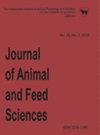Anaerobic rumen fungi and fungal direct-fed microbials in ruminant feeding
IF 1.5
4区 农林科学
Q3 AGRICULTURE, DAIRY & ANIMAL SCIENCE
引用次数: 1
Abstract
. The article discusses the importance and role of fungal direct-fed microbials (DFM) and anaerobic rumen fungi (ARF) in ruminants and their metabolic pathways of plant fibre decomposition, as well as rumen fermentation processes. ARF classification, enzymatic activity, impact on rumen metabolism, as well as fungal DFM and application of their metabolites in ruminant feeding are presented. The research area concerning ARF in ruminant feeding is gaining interest as the subject is still poorly elucidated. The latest research in the field of ruminant physiology and nutrition has pointed to a significant impact of ARF and fungal DFM on nutrient degradability, fermentation profile in the rumen, and animal performance. Although, the proportion of fungi in the total rumen microorganisms is low (approximately 8% of rumen biomass), they play a crucial role in generating a series of enzymes utilising difficult-to-debase compounds, such as cellulose, hemicelluloses and xylose. Although enzymes secreted by ARF are not able to degrade lignin, they can solubilise lignocellulosic complexes and expand the surface area for enzymatic activity. This leads to a better utilisation of fibrous feeds, increased nutrient digestibility, and enhanced rumen fermentation. A comprehensive description and discussion of these issues in the review provides an in-depth look at the role of ARF and the potential use of ARF as DFM in the ruminant nutrition in a-broad perspective.厌氧瘤胃真菌和真菌直接饲养微生物在反刍动物饲养中的作用
。本文讨论了真菌直接饲喂微生物(DFM)和厌氧瘤胃真菌(ARF)在反刍动物中的重要性和作用,以及它们分解植物纤维的代谢途径和瘤胃发酵过程。本文介绍了ARF的分类、酶活性、对瘤胃代谢的影响、真菌DFM及其代谢物在反刍动物饲养中的应用。反刍动物饲养中ARF的研究领域因其尚未得到充分阐明而日益引起人们的关注。反刍动物生理和营养领域的最新研究表明,ARF和真菌DFM对营养物降解率、瘤胃发酵特性和动物生产性能有显著影响。尽管真菌在瘤胃微生物总量中的比例很低(约占瘤胃生物量的8%),但它们在利用纤维素、半纤维素和木糖等难降解化合物产生一系列酶方面发挥着至关重要的作用。虽然ARF分泌的酶不能降解木质素,但它们可以溶解木质纤维素复合物并扩大酶活性的表面积。这样可以更好地利用纤维饲料,提高营养物质的消化率,并增强瘤胃发酵。本文对这些问题进行了全面的描述和讨论,从宏观的角度深入探讨了ARF在反刍动物营养中的作用以及ARF作为DFM的潜在用途。
本文章由计算机程序翻译,如有差异,请以英文原文为准。
求助全文
约1分钟内获得全文
求助全文
来源期刊

Journal of Animal and Feed Sciences
农林科学-奶制品与动物科学
CiteScore
2.10
自引率
0.00%
发文量
42
审稿时长
3 months
期刊介绍:
Journal of Animal and Feed Sciences (JAFS, J. Anim. Feed Sci.) has been published by the Kielanowski Institute of Animal Physiology and Nutrition, Polish Academy of Sciences in Jabłonna (Poland) since 1991. It is a continuation of the Polish-language journal Roczniki Nauk Rolniczych. Seria B, Zootechniczna published by the Polish Academy of Sciences since 1969.
JAFS is an international scientific journal published quarterly, about 40 papers per year including original papers, short communications and occasionally reviews. All papers are peer-reviewed and related to basic and applied researches in the field of animal breeding and genetics, physiology of nutrition, animal feeding, feed technology and food preservation. The journal distinguishes the multidisciplinary nature of physiological and nutritional sciences and so includes papers specialized in all fields connected with animal well-being, including molecular and cell biology and the emerging area of genetics.
 求助内容:
求助内容: 应助结果提醒方式:
应助结果提醒方式:


